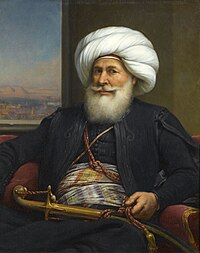Our website is made possible by displaying online advertisements to our visitors.
Please consider supporting us by disabling your ad blocker.
Khedive

Khedive (/kəˈdiːv/ kə-DEEV; Ottoman Turkish: خدیو, romanized: hıdiv; Arabic: خديوي, romanized: khudaywī) was an honorific title of Classical Persian origin used for the sultans and grand viziers of the Ottoman Empire, but most famously for the viceroy of Egypt from 1805 to 1914.[1]
It is attested in Persian poetry from the 10th century and was used as an Ottoman honorific from the 16th. It was borrowed into Ottoman Turkish directly from Persian.[1] It was first used in Egypt, without official recognition, by Muhammad Ali Pasha, the ethnically Albanian governor of Ottoman Egypt and Turco-Egyptian Sudan from 1805 to 1848. The initially self-declared title was officially recognized by the Ottoman government in 1867 and used subsequently by Isma'il Pasha of Egypt and his dynastic successors until 1914.[2] The term entered Arabic in Egypt in the 1850s.[1]
Previous Page Next Page


